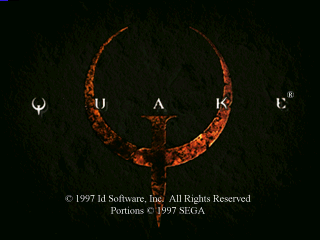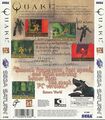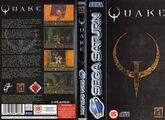Quake
From Sega Retro
This short article is in need of work. You can help Sega Retro by adding to it.
| Quake | ||||||||||||||||||||
|---|---|---|---|---|---|---|---|---|---|---|---|---|---|---|---|---|---|---|---|---|
| System(s): Sega Saturn | ||||||||||||||||||||
| Publisher: Sega | ||||||||||||||||||||
| Developer: Lobotomy Software | ||||||||||||||||||||
| Developer(s) of original games: id Software | ||||||||||||||||||||
| Genre: Shoot-'em-Up | ||||||||||||||||||||
| Number of players: 1 | ||||||||||||||||||||
| ||||||||||||||||||||
Quake is a first person shooter developed by id Software and was originally released for DOS computers in 1996. It was subsequently brought to a variety of other platforms including the Sega Saturn in the following year. The Sega Saturn version of the game was converted by Lobotomy Software and published by Sega.
Quake stands as one of id Software's most successful and milestone among first person shooters. It popularised the use of 3D models in FPS titles (as opposed to using 2D sprites and "2.5D" environments as witnessed in Doom), as well as pre-rendered lightmaps, an engine which could be modified by the community and several important advances in network multiplayer.
Contents
History
Legacy
The sequel, Quake II, was not brought to any Sega system, but was ported to the competing N64 and Playstation. The third part of the series, Quake III Arena, was ported to the Sega Dreamcast.
Versions
Platform Differences
The Saturn version of Quake was handled by Lobotomy Software. Rather than running on the Quake engine like other ports, Lobotomy chose to use their own custom made 3D engine made specifically for the Saturn labeled "Slave Driver". This is also the engine used in other PC-to-Saturn ports such as PowerSlave/Exhumed and Duke Nukem 3D, though Quake is the only game to use fully 3D objects and enemies.
The Saturn port has four exclusive levels named "Purgatorium", "Hell's Aerie", "The Coliseum" and "Watery Grave" replacing original secret levels. The 3D Control Pad can also be used for more precise control. There is no multiplayer mode of any kind in this version. Predictably the Saturn hardware restricts the screen resolution to 320x240 and makes cuts in both polygon counts and texture sizes. Walls were added to guarantee less geometry is rendered in certain sections, causing minor adjustments to the level design. Weapons models that player holds were made 2D, leading to curious effects such as lighting from lighting gun always appearing of same lenght and super shotgun showing muzzle flash twice per shot.
However, thanks to "Slave Drive" engine, Saturn version makes use of colored lighting, which wasn't supported in original PC release. It was feature that would often be brought up when promoting the game. PC release would later get official OpenGL source port, which, while technically supported colored lighting, replaced all dynamic lighting with orange transperent "ball of light" on default configuration.
Curiously under the ESRB system for North America, the Saturn version of the game is the only version to have received a "T" as opposed to "M".
The announcement and subsequent release of a Saturn version of Quake was something of a coup amongst the console's fans, as while a PlayStation version was at one point planned, the conversion was never finished. A Nintendo 64 version was released in the months which followed, but while this version is considered to be the more playable (and more accurate) of the two, it features slightly fewer levels due to cartridge space restrictions.
Regional Differences
US version of a game appears to be improved over EU release, as it was released later. It had some bugs fixed, as well as additional minor changes were implented. Examples are: the looping sound of when the bridge to silver key is done moving in E1M2 (Episode 1 - Map 2) was fixed and rain effect was added to the "Purgatorium" secret level of the first episode.
Input combinations for activating cheats are different between these versions. US codes are the ones that are widely known, while EU version of a game either has less cheats implented or not every combination is known right now.
Credits scenes are different as well. EU version's credits show main character's apartment flat, while Intermission music plays. It's a new addition to Saturn port as well, PC original didn't have any credits scenes. US version in meanwhile had apartment flat scene moved to secret ending, accessable by cheat code, while credits at normal ending shows main hall of E1M2 instead. Both endings play a new music track found only in this version, which is credited as well.
Magazine articles
- Main article: Quake/Magazine articles.
Promotional material
- 1997 10 - Quake.jpg
ES print advert
Physical scans
| Sega Retro Average | ||||||||||||||||||||||||||||||||||||||||||||||||||||||||||||||||||||||||||||||||||||||||||||||||||||||||
|---|---|---|---|---|---|---|---|---|---|---|---|---|---|---|---|---|---|---|---|---|---|---|---|---|---|---|---|---|---|---|---|---|---|---|---|---|---|---|---|---|---|---|---|---|---|---|---|---|---|---|---|---|---|---|---|---|---|---|---|---|---|---|---|---|---|---|---|---|---|---|---|---|---|---|---|---|---|---|---|---|---|---|---|---|---|---|---|---|---|---|---|---|---|---|---|---|---|---|---|---|---|---|---|---|
|
| 83 | |
|---|---|
| Based on 20 reviews | |
Technical information
Save data
Quake makes use of the Saturn's internal battery back-up as well as the Saturn Backup Memory to save data for progress. To load and save data from the Ram Cart, the save file must be created on the internal battery back-up first, then moved over via the Memory Manager.
| Name | Comment | File Size |
|---|---|---|
| LOBOQUAKE__ | save games | 23 |
References
- ↑ File:CVG UK 191.pdf, page 24
- ↑ 2.0 2.1 File:CVG UK 193.pdf, page 108 Cite error: Invalid
<ref>tag; name ":File:CVG UK 193.pdf_p108" defined multiple times with different content - ↑ 3.0 3.1 File:ConsolesPlus FR 070.pdf, page 114 Cite error: Invalid
<ref>tag; name ":File:ConsolesPlus FR 070.pdf_p114" defined multiple times with different content - ↑ File:CVG_UK_193.pdf, page 109
- ↑ 5.0 5.1 File:Edge UK 053.pdf, page 111 Cite error: Invalid
<ref>tag; name ":File:Edge UK 053.pdf_p111" defined multiple times with different content - ↑ 6.0 6.1 File:SaturnPower UK 08.pdf, page 68 Cite error: Invalid
<ref>tag; name ":File:SaturnPower UK 08.pdf_p68" defined multiple times with different content - ↑ File:SSM_UK_26.pdf, page 74
- ↑ Digitiser (UK) (1997-11-28)
- ↑ Electronic Gaming Monthly, "February 1998" (US; 1998-0x-xx), page 109
- ↑ GameFan, "Volume 5, Issue 12: December 1997" (US; 1997-xx-xx), page 26
- ↑ GamePro, "February 1998" (US; 199x-xx-xx), page 98
- ↑ GamesMaster, "Christmas 1997" (UK; 1997-11-24), page 30
- ↑ Game Informer, "January 1998" (US; 199x-xx-xx), page 60
- ↑ Gry Komputerowe, "3/1998" (PL; 1998-xx-xx), page 1
- ↑ Hobby Consolas, "Diciembre 1997" (ES; 1997-xx-xx), page 110
- ↑ L'essential des Achats pour Consoles, "Vol. 1" (FR; 1998-11-25), page 75
- ↑ Level, "4/98" (TR; 1998-xx-xx), page 1
- ↑ Mega Console, "Dicembre 1997" (IT; 1997-xx-xx), page 60
- ↑ Mega Force, "Novembre/Décembre 1997" (FR; 1997-1x-xx), page 46
- ↑ Neo, "Luty 1998" (PL; 1998-xx-xx), page 39
- ↑ Next Generation, "February 1998" (US; 1998-01-20), page 116
- ↑ Sega Saturn Magazine, "December 1997" (UK; 1997-11-12), page 74
- ↑ Super Power, "2 1998" (FI; 1998-0x-xx), page 36
- Pages with broken file links
- Pages with reference errors
- Stubs
- 1 player games
- US Saturn games
- All US games
- EU Saturn games
- All EU games
- BR Saturn games
- All BR games
- Saturn games
- 1997 Saturn games
- All 1997 games
- Saturn shoot-'em-up games
- All shoot-'em-up games
- Old content rating field
- All games
- Old-style rating (consolesplus)
- Use magref
- Old-style rating (cvg)
- Old-style rating (edge)
- Old-style rating (gamesmaster)
- Rating without PDF source
- Old-style rating (saturnpower)
- Old-style rating (ssm)
- Update ratings template
- 6 old ratings






